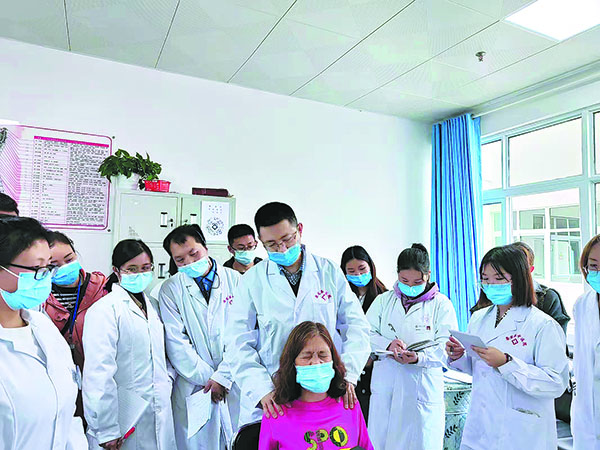Pinpointing growth of TCM culture


He's also skilled in treating neurological issues like strokes and facial paralysis, along with emotional disorders such as insomnia, anxiety and depression.
Yang has noticed a rising number of patients grappling with insomnia and anxiety. He attributes this to modern lifestyles — while people eat better, they move less and face greater stress, leading to more restless nights and anxious days. Surprisingly, even children are experiencing these issues.
"Many patients complaining of neck pain are actually suffering from excessive psychological stress," Yang explains. "Acupuncture can effectively relieve this by clearing the body's energy pathways."
He stresses the need for personalized treatment, as no two cases are alike. "For instance, some people's insomnia is due to overwhelming stress, and acupuncture can help them release built-up tension," he says. "Others may be struggling with overly intense emotions. Each person requires a unique approach to treatment."
Yang recently encountered a patient who had struggled with insomnia for over four years. She had undergone psychiatric treatment and followed a course of medication without relief. Despite trying various therapies like yoga, her condition persisted.
During examination, Yang noticed old scars on the patient's abdomen. The skin around the scars was cold to the touch, and pressing on them caused significant pain. After a comprehensive assessment, Yang decided to try acupuncture on the scars. After six sessions, the patient's insomnia and anxiety vanished and eventually, she no longer needed her medication.
Yang says he believes this case demonstrates acupuncture's remarkable effectiveness.
Apart from his busy schedule treating patients, Yang also teaches undergraduate, postgraduate, and doctoral students.
Huang Yu is one of Yang's doctoral students, and focuses on acupuncture's role in treating spinal disorders.
The 28-year-old's journey into acupuncture began during her undergraduate studies in TCM, but it wasn't until she joined Yang's research team that she truly grasped its potential.
"It's not just about treating symptoms; he evaluates each patient comprehensively," Huang explains. "Yang considers pulse diagnosis, meridian examination, and individual conditions to tailor treatment."
For example, when dealing with neck pain, Yang might target points on the back or legs, or even suggest breathing exercises instead of acupuncture.
Huang says that Yang is an incredibly patient teacher and doctor, always willing to carefully explain things, especially to patients who may not immediately understand.
"When we watch him with patients, sometimes we're puzzled by his choices, but during his lectures, everything clicks. His insights help the knowledge sink in deeper than just giving us simple answers," Huang says.
Huang has also observed an intriguing practice: During doctoral classes, Yang sometimes chooses a student suffering from discomfort to be a model patient. The opportunity is eagerly sought after in the class, as the students who are chosen are able to feel firsthand the effectiveness of Yang's healing capabilities.
In addition to clinical work and lectures, Yang encourages his students to delve into traditional culture and classic Chinese medical texts.
Yang says that modern medical students have abundant resources at their fingertips. He hopes future TCM practitioners will blend modern technology with ancient wisdom to innovate and develop new techniques, enhancing healthcare for all.
"Our students should look beyond Guizhou and aim to serve people nationwide, and even globally," he emphasizes.
Yang has noticed a rising interest among young people in TCM, with many looking up TCM-related knowledge themselves. He advises them to start with classics like Huangdi Neijing (Inner Canon of the Yellow Emperor) and Shanghan Lun (Treatise on Febrile Diseases Caused by Cold).
"When studying these classics, it's crucial to understand TCM's original creative thinking patterns," Yang explains. "Diagnosing a patient requires considering not just the individual, but also their environment."
He suggests exploring the wisdom within TCM culture to boost self-awareness and better prevent future illnesses.
Yang says young people can learn simple TCM techniques like meridian tuina (therapeutic massage), but stresses the importance of guidance from qualified professionals to avoid mistakes.
In cases where patients have limited time for follow-up visits, Yang teaches them basic meridian tuina techniques to maintain the effectiveness of treatment. "It's safe, effective, and saves time," he says.




































